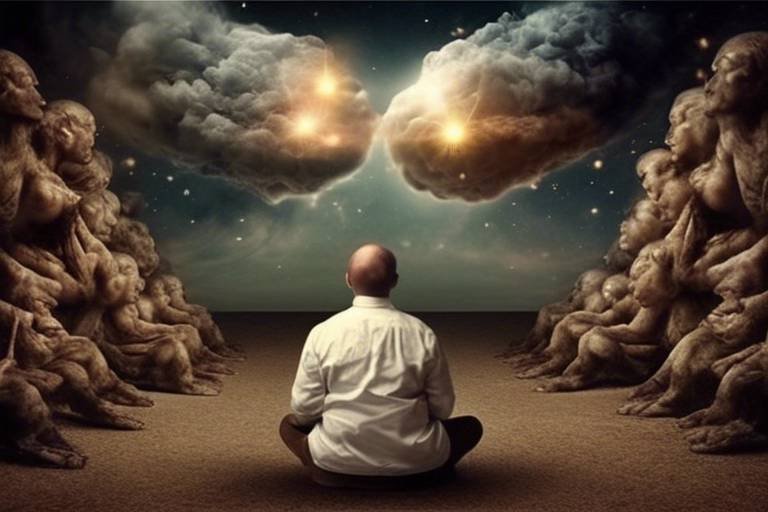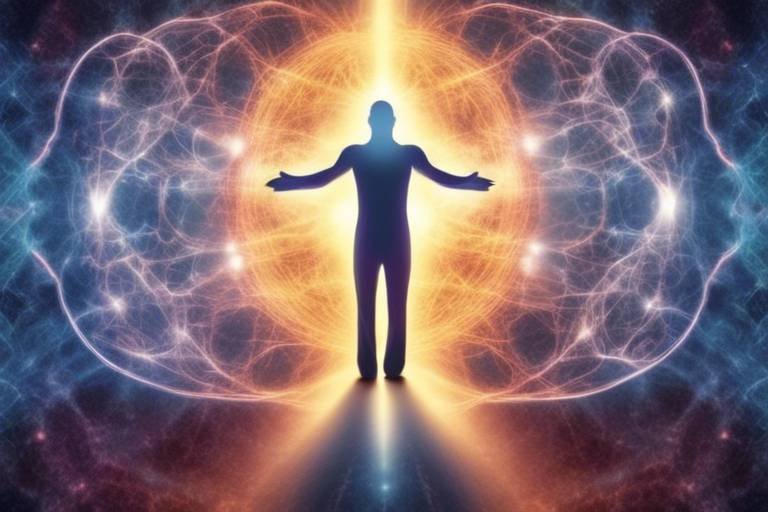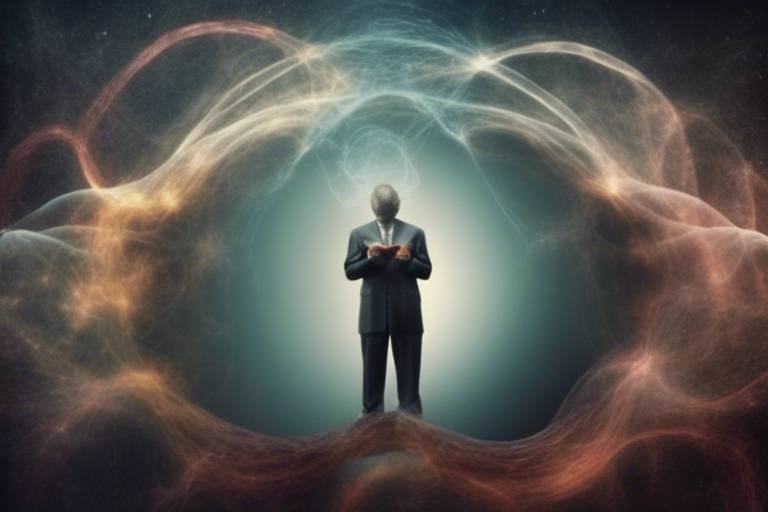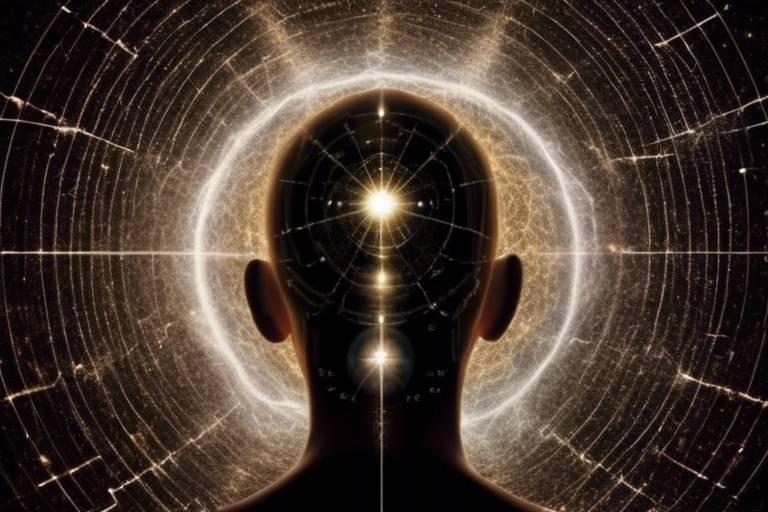Metaphysics and Metaphysical Experiences - An Overview
Metaphysics is a fascinating field that dives deep into the questions that shape our understanding of existence. What is reality? What does it mean to exist? These are not just idle musings; they are profound inquiries that have captivated thinkers for centuries. In this article, we will explore the fundamental concepts of metaphysics, its rich historical background, and the various metaphysical experiences that influence our perception of reality.
At its core, metaphysics is a branch of philosophy that investigates the fundamental nature of reality. It delves into the essence of being, existence, and the universe itself. Have you ever pondered about what lies beyond our immediate perception? Metaphysics seeks to answer those profound questions that often leave us scratching our heads. It invites us to explore the nature of objects, their properties, and the relationships that bind them. Think of it as the ultimate quest for understanding, where philosophers and curious minds alike embark on a journey to uncover the mysteries of existence.
The roots of metaphysics can be traced back to ancient philosophers like Aristotle and Plato. These thinkers laid the groundwork for metaphysical inquiry, shaping the discourse that would follow for centuries. Aristotle, with his emphasis on substance and causality, introduced ideas that continue to influence philosophical debates today. Meanwhile, Plato's Theory of Forms presented a contrasting view, suggesting that non-material abstract forms represent the most accurate reality. This historical backdrop is essential for understanding how metaphysical thought has evolved and influenced modern philosophy.
Throughout history, several key philosophers have made significant contributions to metaphysical thought. These include:
- René Descartes: Known for his statement "I think, therefore I am," Descartes explored the nature of existence and the mind-body relationship.
- Immanuel Kant: Kant challenged previous metaphysical frameworks, arguing that our understanding of reality is shaped by the way we perceive it.
- Martin Heidegger: Heidegger's exploration of being and time brought a new perspective to metaphysical discussions, emphasizing the importance of existence itself.
These philosophers, among others, have shaped contemporary discussions around metaphysics, influencing how we perceive reality today.
Aristotle's work laid the groundwork for metaphysical inquiry. He introduced essential concepts like substance, causality, and potentiality, which continue to resonate in philosophical debates. Substance, for instance, refers to what something fundamentally is, while causality examines how things come to be. These ideas are not just academic; they provide a framework for understanding the world around us. When we ask why things happen, we are engaging with Aristotle's metaphysical inquiries.
On the other hand, Plato's Theory of Forms posits that non-material abstract forms represent the most accurate reality. According to Plato, the material world is just a shadow of these perfect forms. This concept has stirred countless discussions and debates throughout the ages, influencing metaphysical discussions for centuries. Imagine the world as a series of reflections in a funhouse mirror—what we see is distorted, yet it points to a deeper, more perfect reality beyond our immediate grasp.
Today, contemporary metaphysics encompasses a variety of viewpoints, including materialism, idealism, and dualism. Materialism posits that only physical things exist, while idealism suggests that reality is mentally constructed. Dualism, on the other hand, argues for the coexistence of both mind and matter. These perspectives shape our understanding of reality and influence how we interpret our experiences.
Metaphysical experiences often refer to encounters that transcend ordinary perception. These can include mystical experiences, altered states of consciousness, and even encounters with the divine. Such experiences are significant because they challenge our conventional understanding of reality. They invite us to explore dimensions of existence that go beyond the physical realm.
Mystical experiences involve profound moments of connection with the universe or a higher power. Imagine standing on a mountaintop, feeling an overwhelming sense of unity with everything around you. These moments can lead to transformative insights and a deeper understanding of existence. They often leave individuals with a lasting sense of peace and purpose, reshaping their worldview.
Altered states of consciousness, achieved through meditation, psychedelics, or other means, can provide unique metaphysical insights. These experiences often challenge the nature of reality, pushing the boundaries of what we consider possible. When we step outside our usual modes of thinking, we may encounter truths that were previously hidden from view.
Metaphysical beliefs significantly influence personal worldview, ethics, and spirituality. They shape how we perceive ourselves and our place in the universe. For instance, an individual who believes in a connected universe may approach life with a sense of purpose and compassion, while someone with a materialistic view may prioritize tangible achievements. Understanding these beliefs can help us navigate the complexities of human experience and behavior.
- What is metaphysics? Metaphysics is a branch of philosophy that explores the fundamental nature of reality, including concepts like being and existence.
- Who are some key philosophers in metaphysics? Influential philosophers include Aristotle, Plato, Descartes, Kant, and Heidegger.
- What are metaphysical experiences? These are encounters that transcend ordinary perception, such as mystical experiences and altered states of consciousness.
- How do metaphysical beliefs affect our lives? They shape our worldview, ethics, and spirituality, influencing how we interact with the world and others.

Understanding Metaphysics
Metaphysics is not just a fancy term thrown around in philosophical circles; it's a profound branch of philosophy that digs deep into the fundamental nature of reality. Imagine standing at the edge of a vast ocean, looking out at the horizon. What lies beyond? This is the kind of question metaphysics seeks to explore. It dives into concepts like being, existence, and the very fabric of the universe itself. It’s like peeling back the layers of an onion, each layer revealing more about life, existence, and the universe.
At its core, metaphysics grapples with questions that many of us ponder but often overlook in our daily lives. For instance, what does it mean to exist? Is there a purpose behind our existence? And what about the universe—what is its nature? These questions are not just philosophical musings; they strike at the heart of human curiosity and our quest for understanding.
To simplify, we can break down metaphysics into a few key areas:
- Ontology: This is the study of being and existence. It asks questions like, "What does it mean to be?" and "What categories of things exist?"
- Cosmology: This area explores the origins and structure of the universe. Think of it as the "big picture" of reality.
- Metaphysical Epistemology: This branch examines the nature of knowledge itself. How do we know what we know about existence?
These branches are interconnected, each influencing the other, creating a rich tapestry of inquiry that has evolved over centuries. Metaphysics challenges us to think outside the box, pushing the boundaries of our understanding. It's like trying to solve a complex puzzle where each piece represents a different aspect of reality.
In today's world, metaphysics is more relevant than ever. With advancements in science and technology, we're constantly faced with new questions about reality. For instance, consider the implications of quantum physics. It challenges our traditional notions of reality and existence, leading to debates that echo the ancient philosophical inquiries. Are we merely observers in a universe governed by chance, or is there a deeper, more profound structure underlying it all?
Ultimately, metaphysics invites us to engage in a dialogue with ourselves and the universe. It encourages us to ask questions, seek answers, and reflect on our place in the grand scheme of things. As we navigate through our lives, embracing the mysteries of existence can lead to a richer, more fulfilling experience. So, the next time you find yourself gazing at the stars or pondering your purpose, remember that you’re participating in a long-standing tradition of metaphysical inquiry.

Historical Background of Metaphysics
Metaphysics, often considered the backbone of philosophical inquiry, has a rich and intricate history that stretches back to the ancient world. It is a field that seeks to unravel the mysteries of existence, reality, and the universe itself. The journey of metaphysical thought began with the early Greek philosophers, who laid the groundwork for centuries of exploration into the nature of being. Think of it as a vast tapestry woven from the threads of human curiosity, each philosopher adding their unique perspective and insights.
One cannot discuss the historical background of metaphysics without mentioning the towering figures of Aristotle and Plato. These two philosophers, often seen as the bedrock of Western philosophy, introduced concepts that continue to resonate today. Aristotle’s emphasis on substance and causality provided a framework for understanding the physical world, while Plato’s Theory of Forms argued that the material world is merely a shadow of a higher, more perfect reality. Their ideas sparked a flame of inquiry that would ignite debates for millennia.
As we move through history, we encounter a myriad of thinkers who contributed to the evolution of metaphysical thought. The Middle Ages saw a fusion of classical philosophy with religious doctrine, particularly within the works of philosophers like St. Augustine and St. Thomas Aquinas. They sought to reconcile faith with reason, exploring metaphysical questions through a theological lens. This period was marked by a profound belief in a divine order, leading to discussions about the nature of God, existence, and morality.
The Renaissance brought about a revival of interest in classical texts, leading to a renewed focus on humanism and individual experience. Thinkers like Descartes and Spinoza began to challenge the prevailing metaphysical views by introducing concepts of dualism and monism. Descartes famously declared, "I think, therefore I am," emphasizing the importance of consciousness in understanding existence. This period was a pivotal point that set the stage for modern philosophical thought.
Fast forward to the 18th and 19th centuries, where the likes of Kant and Hegel further pushed the boundaries of metaphysics. Kant’s critical philosophy questioned the limits of human understanding, suggesting that while we can know the phenomena of the world, the noumena—the things in themselves—remain elusive. Hegel, on the other hand, proposed a dynamic view of reality, where contradictions and resolutions drive the evolution of ideas.
In the 20th century, metaphysics faced challenges from various schools of thought, including logical positivism and existentialism. Thinkers like Heidegger redefined metaphysical inquiries by focusing on existence and being, while others critiqued metaphysical speculation as meaningless. Despite these challenges, metaphysical questions remain relevant, influencing contemporary debates in philosophy, science, and spirituality.
Today, metaphysics is a vibrant field that continues to evolve. It encompasses diverse perspectives, from materialism to idealism, and invites us to ponder profound questions about reality. The historical journey of metaphysics is a testament to humanity's relentless quest for understanding—an exploration that remains as relevant today as it was in the days of Aristotle and Plato.
- What is metaphysics? Metaphysics is a branch of philosophy that examines the fundamental nature of reality, including concepts like existence, being, and the universe.
- Who are some key philosophers in metaphysics? Notable philosophers include Aristotle, Plato, Descartes, Kant, and Heidegger, each contributing significantly to metaphysical thought.
- How has metaphysics evolved over time? Metaphysics has evolved from ancient philosophical inquiries to modern debates, incorporating various perspectives and challenging previous notions of reality.
- Why is metaphysics important? Metaphysics helps us explore profound questions about existence and reality, influencing our understanding of the world and our place within it.

Key Philosophers in Metaphysics
When diving into the rich tapestry of metaphysical thought, it's impossible to overlook the contributions of several key philosophers who have shaped our understanding of reality. These thinkers didn't just ponder abstract concepts; they laid the groundwork for how we perceive existence itself. Among them, René Descartes, Immanuel Kant, and Martin Heidegger stand out as monumental figures. Their ideas continue to resonate in contemporary philosophical discussions and influence various fields, from science to spirituality.
René Descartes, often hailed as the father of modern philosophy, is most famous for his statement, "Cogito, ergo sum" or "I think, therefore I am." This assertion reflects his belief that the act of thinking is the fundamental proof of one's existence. Descartes sought to establish a foundation for knowledge that was beyond doubt, leading him to explore the nature of reality through a dualistic lens. He posited that the mind and body are distinct entities, a perspective that has sparked endless debates about consciousness and existence. His work, particularly in Meditations on First Philosophy, challenges us to consider: what is the essence of being?
Moving forward in time, we encounter Immanuel Kant, a philosopher who revolutionized metaphysics with his critical approach. Kant argued that our understanding of the universe is shaped by our perceptions, suggesting that while we can know phenomena (the world as we experience it), the noumena (the world as it exists independently of our experience) remains fundamentally unknowable. This idea raises intriguing questions about the limits of human understanding and the nature of reality itself. His seminal work, Critique of Pure Reason, invites us to ponder the relationship between our thoughts and the external world, challenging the very foundations of metaphysical inquiry.
Lastly, Martin Heidegger brought a unique perspective to metaphysics by emphasizing the importance of being. In his groundbreaking work, Being and Time, Heidegger explores what it means to exist, introducing the concept of "Dasein," or "being-there." He argues that our understanding of being is intertwined with our experiences and our temporal existence. Heidegger's focus on authenticity and the human condition invites us to reflect on our place in the universe and how we relate to the world around us. His existential approach adds a layer of depth to metaphysical discussions, prompting us to ask: how do we understand our existence in a seemingly indifferent universe?
These philosophers, among others, have not only contributed to metaphysical thought but have also influenced various aspects of human understanding. Their ideas can be summarized in the following table:
| Philosopher | Key Contribution | Notable Work |
|---|---|---|
| René Descartes | Dualism; "Cogito, ergo sum" | Meditations on First Philosophy |
| Immanuel Kant | Phenomena vs. Noumena | Critique of Pure Reason |
| Martin Heidegger | Existentialism; Being and Dasein | Being and Time |
In conclusion, the contributions of these key philosophers have profoundly shaped metaphysical thought. Their explorations of existence, reality, and consciousness continue to inspire and challenge us, inviting us to examine our own beliefs and perceptions. As we navigate through the complexities of metaphysics, we can appreciate the rich intellectual heritage left behind by these thinkers, which serves as a foundation for ongoing philosophical inquiry.
- What is metaphysics? - Metaphysics is a branch of philosophy that studies the fundamental nature of reality, including concepts such as being, existence, and the universe.
- Who are the key philosophers in metaphysics? - Key philosophers include René Descartes, Immanuel Kant, and Martin Heidegger, each contributing unique perspectives to metaphysical thought.
- What is the significance of Descartes' dualism? - Descartes' dualism posits a distinction between mind and body, influencing discussions on consciousness and existence.
- How did Kant change metaphysical thought? - Kant introduced the idea that our understanding of reality is shaped by our perceptions, distinguishing between phenomena and noumena.
- What does Heidegger mean by 'Dasein'? - 'Dasein' refers to the experience of being present in the world, emphasizing the importance of existence and authenticity.

Aristotle’s Contribution
Aristotle, one of the most pivotal figures in Western philosophy, made profound contributions to metaphysics that continue to resonate through the ages. His work laid the groundwork for metaphysical inquiry, introducing essential concepts that have shaped our understanding of reality. One of the key ideas Aristotle presented is the notion of substance, which he defined as that which exists independently and serves as the fundamental reality of things. For Aristotle, substances are not merely physical objects; they embody both matter and form, which together create the essence of what something truly is.
Another cornerstone of Aristotle's metaphysical thought is the principle of causality. He proposed that everything in the universe has a cause and effect, which can be categorized into four types of causes:
- Material Cause: What something is made of.
- Formal Cause: The form or essence of a thing.
- Efficient Cause: The agent or process that brings something into being.
- Final Cause: The purpose or goal of a thing.
Aristotle also introduced the concept of potentiality and actuality. He argued that everything in the universe has the potential to become something else, and this potential can be realized through actualization. For instance, an acorn has the potential to grow into an oak tree, but it must undergo the necessary processes to achieve its full form. This idea of potentiality versus actuality has profound implications for understanding change, existence, and the nature of being itself.
In addition to these concepts, Aristotle's metaphysical inquiries led him to explore the idea of the unmoved mover. He posited that there must be a primary cause or entity that itself is not caused by anything else; this entity is necessary to explain the existence of motion and change in the universe. This notion has sparked extensive debate and discussion throughout history, influencing theologians and philosophers alike.
In summary, Aristotle's contributions to metaphysics are monumental and multifaceted. His exploration of substance, causality, potentiality and actuality, and the unmoved mover has provided a rich framework for understanding the complexities of existence. His ideas not only shaped the philosophical landscape of his time but also laid the groundwork for future generations to explore the depths of metaphysical thought.
1. What is metaphysics?
Metaphysics is a branch of philosophy that investigates the fundamental nature of reality, including concepts like being, existence, and the universe.
2. Who is Aristotle?
Aristotle was an ancient Greek philosopher whose works have significantly influenced various fields, including metaphysics, ethics, and science.
3. What is the significance of substance in Aristotle's philosophy?
Substance is crucial in Aristotle's philosophy as it refers to the fundamental reality of things, encompassing both matter and form.
4. How did Aristotle influence modern philosophy?
Aristotle's concepts of causality, potentiality, and actuality have provided a framework for both philosophical and scientific inquiry, influencing countless thinkers throughout history.

Plato’s Theory of Forms
Plato’s Theory of Forms is a cornerstone of his philosophical thought, presenting a compelling view of reality that has sparked countless debates and discussions over the centuries. According to Plato, the physical world we perceive with our senses is merely a shadow of a higher, unchanging reality composed of abstract Forms or Ideas. These Forms are the true essence of all things; they are perfect, eternal, and exist beyond the limitations of our material world. For instance, when we see a beautiful object, we recognize its beauty because it participates in the Form of Beauty itself, which is an ideal and perfect concept.
This theory posits that every tangible object or quality we encounter is just a reflection of its corresponding Form. To illustrate, think of a chair: every chair you see is merely an imperfect imitation of the ideal Form of "Chairness." This notion suggests that there is a perfect blueprint for every object and concept, and our world is filled with imperfect replicas of these Forms. Plato believed that through philosophical reasoning and intellectual inquiry, individuals could gain access to these Forms and thus achieve a deeper understanding of reality.
Plato’s Theory of Forms also raises intriguing questions about knowledge and perception. If the physical world is only an illusion, how can we truly know anything? Plato argues that knowledge gained through sensory experience is unreliable. Instead, he advocates for a form of knowledge that transcends the physical, which he believes can be attained through rational thought and philosophical contemplation. This perspective invites us to consider the nature of our own understanding and challenges us to look beyond the surface of things.
Furthermore, the implications of Plato's theory extend into ethics and morality. If the Forms represent the highest ideals, then understanding these Forms is essential for leading a virtuous life. For example, to truly grasp what justice is, one must contemplate the Form of Justice itself, rather than merely observing acts of justice in the physical world. This pursuit of understanding the Forms encourages individuals to strive for a higher moral standard, pushing them to align their actions with these eternal truths.
In summary, Plato’s Theory of Forms offers a profound and thought-provoking framework for understanding reality. It compels us to question the validity of our perceptions and encourages a journey towards higher knowledge and moral excellence. As we delve deeper into the realms of philosophy, Plato’s insights continue to resonate, inviting us to explore the essence of existence itself.

Modern Metaphysical Perspectives
In today's fast-paced world, the exploration of has become increasingly relevant. As we navigate through life, we often find ourselves questioning the very fabric of our existence. What is real? What lies beyond our physical senses? These inquiries have led to the emergence of various metaphysical viewpoints that seek to explain the complexities of reality.
One of the most prominent perspectives is materialism, which posits that only physical matter exists. According to materialists, everything that happens can be explained through physical processes and interactions. This view aligns closely with the scientific method, emphasizing empirical evidence and observable phenomena. However, critics argue that materialism fails to account for the richness of human experience, particularly those aspects that seem to transcend the physical realm, such as consciousness and spirituality.
On the opposite end of the spectrum lies idealism, a perspective that suggests reality is fundamentally mental or spiritual. Idealists argue that the material world is merely a manifestation of our thoughts and perceptions. This viewpoint invites us to consider the power of our minds in shaping our experiences. For instance, have you ever noticed how your mood can alter your perception of the world around you? This idea resonates with the idealist belief that our consciousness plays a crucial role in defining reality.
Another significant perspective is dualism, which posits that both the material and immaterial worlds exist independently yet interact with each other. This view was famously articulated by philosopher René Descartes, who argued that the mind and body are distinct entities. Dualism raises intriguing questions about the nature of consciousness and its relationship with the physical body. For example, if the mind is separate from the body, what happens to our consciousness after death? These questions continue to fuel philosophical debates and personal reflections.
In recent years, a more integrative approach has emerged, often referred to as panpsychism. This perspective suggests that consciousness is a fundamental feature of the universe, present in varying degrees in all entities, from humans to atoms. Imagine a world where everything, even inanimate objects, possesses some form of consciousness. This idea challenges our traditional understanding of consciousness and invites us to reconsider our relationship with the universe.
Ultimately, the exploration of modern metaphysical perspectives is not just an academic exercise; it profoundly impacts our daily lives. Our beliefs about reality shape our ethics, spirituality, and interactions with others. As we delve into these perspectives, we may find ourselves reflecting on our own beliefs and experiences, leading to a richer understanding of what it means to be human.
- What is metaphysics? Metaphysics is a branch of philosophy that explores the fundamental nature of reality, including concepts such as existence, being, and the universe.
- How does modern metaphysics differ from traditional metaphysics? Modern metaphysics incorporates contemporary viewpoints, such as materialism, idealism, dualism, and panpsychism, reflecting current philosophical and scientific discourse.
- Why are metaphysical beliefs important? Metaphysical beliefs influence our worldview, ethics, and spirituality, shaping how we perceive and interact with the world around us.
- Can metaphysical experiences be scientifically studied? While metaphysical experiences often transcend empirical measurement, researchers are increasingly exploring altered states of consciousness and their implications for understanding reality.

Metaphysical Experiences Defined
When we talk about metaphysical experiences, we're diving into a realm that goes beyond the ordinary. These experiences often refer to moments that transcend our usual perceptions of reality, opening doors to deeper understanding and connection with the universe. Imagine standing at the edge of a vast ocean, feeling the waves crash against your feet, and suddenly realizing that you are part of something much larger than yourself. That’s the essence of metaphysical experiences; they pull you out of the mundane and into a realm where the lines between the self and the cosmos blur.
These experiences can manifest in various forms, each offering unique insights and revelations. Some of the most notable types include:
- Mystical Experiences: These are often characterized by a profound sense of unity with the universe or a higher power. Individuals report feelings of deep peace, joy, and a sense of understanding that transcends everyday experiences. It’s like having a light bulb moment that illuminates the darkest corners of your mind.
- Altered States of Consciousness: Achieved through practices such as meditation, the use of psychedelics, or even through extreme physical exertion, these states can provide insights that challenge our conventional understanding of reality. Think of it as stepping into a different dimension where the rules of time and space seem to bend.
- Encounters with the Divine: Many individuals describe experiences where they feel a direct connection with a divine entity or force. These moments can be life-changing, reshaping one’s beliefs and values in profound ways.
What’s fascinating is how these experiences can vary widely from person to person. For some, a mystical experience may occur during a quiet moment of reflection, while for others, it might happen in the midst of a chaotic life event. The common thread is the transformative power they hold. They often lead to a reevaluation of one's life, beliefs, and purpose, much like a compass that points you in a new direction.
Moreover, the significance of these experiences extends beyond the individual. They can ripple through communities, influencing collective beliefs and practices. Think of cultures that have rich traditions of spirituality and metaphysics; their communal experiences often shape their worldview, ethics, and even social structures. This interconnectedness highlights how metaphysical experiences are not just personal journeys but also shared human phenomena.
In conclusion, metaphysical experiences are more than mere occurrences; they are gateways to understanding the deeper layers of existence. They challenge us to question our perceptions, beliefs, and the very nature of reality. As we explore these profound moments, we begin to uncover the intricate tapestry of life that binds us all together.
Q: What are metaphysical experiences?
A: Metaphysical experiences refer to encounters that transcend ordinary perception, leading to deeper insights about existence and our connection to the universe.
Q: How can one have a metaphysical experience?
A: Metaphysical experiences can occur through various means, including meditation, psychedelics, or spontaneous moments of insight during daily life.
Q: Are metaphysical experiences the same for everyone?
A: No, metaphysical experiences can vary greatly from person to person, influenced by individual beliefs, backgrounds, and circumstances.
Q: What impact do these experiences have on a person's life?
A: Many individuals report that metaphysical experiences lead to significant changes in their worldview, ethics, and sense of purpose, often resulting in a more profound connection to life.

Mystical Experiences
Mystical experiences are often described as profound moments when individuals feel a deep connection with the universe or a higher power. These experiences transcend the ordinary, pulling people into a realm where the boundaries of reality seem to dissolve. Imagine standing on the edge of a vast ocean, feeling the cool breeze on your face, and suddenly realizing that you are not just an observer but an integral part of this magnificent expanse. This is the essence of a mystical experience—where the self merges with the cosmos, leading to transformative insights about existence and our place within it.
Throughout history, many individuals have reported mystical experiences that have changed their lives forever. These moments can be spontaneous or induced through practices such as meditation, prayer, or even certain substances. The common thread is that they often lead to a profound sense of peace, understanding, and connection. For instance, consider the stories of spiritual leaders who describe their encounters with the divine. These narratives often share similar themes, such as feelings of unity, love, and an overwhelming sense of purpose.
One fascinating aspect of mystical experiences is their ability to challenge our conventional understanding of reality. They raise questions that many of us ponder but rarely articulate: What is the nature of existence? Is there something greater than ourselves? Are we all connected in ways we cannot fully comprehend? These experiences often leave individuals with a deep sense of wonder and curiosity, compelling them to explore further.
To illustrate the impact of mystical experiences, let's take a look at a few key characteristics that many people report:
- Unity with the Universe: A feeling of interconnectedness with all living beings and the cosmos.
- Timelessness: A sense that time is irrelevant, where past, present, and future seem to merge.
- Inexpressible Joy: An overwhelming feeling of happiness and peace that words often fail to capture.
- Profound Insight: Sudden clarity about life, existence, and personal purpose.
These elements contribute to the transformative power of mystical experiences, often leading individuals to reassess their beliefs, values, and priorities. Many report that after such experiences, they feel a renewed sense of purpose and a desire to live more authentically. It's as if they have been given a glimpse into a deeper reality that compels them to align their lives with that understanding.
Moreover, the implications of these experiences extend beyond the individual. When shared within communities, they can foster a sense of belonging and collective understanding. They often serve as catalysts for spiritual movements, encouraging others to seek their own experiences and explore the mysteries of existence. In this way, mystical experiences not only enrich individual lives but also contribute to the broader tapestry of human spirituality.
In conclusion, mystical experiences are powerful encounters that can transform our understanding of reality. They challenge us to look beyond the mundane and explore the deeper connections we share with the universe. Whether through spontaneous moments or intentional practices, these experiences remind us of the profound mysteries that lie at the heart of existence.
What are mystical experiences?
Mystical experiences are profound moments of connection with the universe or a higher power, often leading to transformative insights and a deeper understanding of existence.
How can one induce a mystical experience?
Many people report achieving mystical experiences through practices such as meditation, prayer, deep contemplation, or even certain psychedelic substances. Each individual's path may vary.
Are mystical experiences the same for everyone?
While many report similar characteristics, mystical experiences are highly personal and can vary greatly from individual to individual in terms of intensity and interpretation.
Do mystical experiences have any psychological effects?
Yes, many individuals report long-lasting changes in their perspectives, values, and emotional well-being following a mystical experience, often leading to a greater sense of peace and purpose in life.

Altered States of Consciousness
When we talk about , we're diving into a fascinating realm where the ordinary boundaries of perception and reality blur. These states can be induced through various means, such as meditation, psychedelics, sensory deprivation, or even intense physical experiences. Imagine stepping into a world where time feels elastic, colors seem more vibrant, and thoughts flow freely like a river. This is the essence of altered states—where the mind transcends its usual confines.
One of the most intriguing aspects of altered states is their ability to provide profound insights into the nature of reality. For many, these experiences lead to a sense of unity with the universe, a feeling of oneness that can be both exhilarating and humbling. People often report encountering deep truths about existence, love, and connection that seem to elude them in their everyday lives. It’s as if the veil of ordinary perception has been lifted, revealing a richer tapestry of existence.
Consider the various methods through which these states can be accessed:
- Meditation: A practice that encourages deep relaxation and heightened awareness, often leading to transcendent experiences.
- Psychedelics: Substances like psilocybin or LSD can dramatically alter perception and consciousness, opening doors to new ways of understanding reality.
- Breathwork: Techniques that utilize controlled breathing patterns to induce altered states, often resulting in emotional release and clarity.
- Extreme Physical Activity: Engaging in intense physical exertion can lead to a state of flow where the mind and body operate in harmony, sometimes resulting in transcendent experiences.
Research has shown that these altered states can have significant implications for personal development and mental health. For instance, individuals who practice meditation regularly often report reduced stress levels, increased emotional well-being, and a greater sense of purpose in life. Similarly, those who explore psychedelics in a controlled, intentional setting have documented life-changing insights and emotional breakthroughs. It’s almost as if these experiences serve as a mirror, reflecting back to us the deeper aspects of our psyche that we may not confront in our daily routines.
However, it’s important to approach altered states with caution and respect. While they can be enlightening, they also come with risks. Not everyone is prepared for the intense emotions or revelations that can arise. Therefore, creating a safe environment, whether through guided sessions or supportive communities, is crucial for anyone venturing into these realms. Just like a roller coaster, the thrill can be exhilarating, but it’s essential to buckle up and know the ride before you dive in.
In conclusion, altered states of consciousness offer a unique lens through which we can explore the mysteries of existence. They challenge our conventional understanding and invite us to consider the possibility that reality is far more intricate and beautiful than we typically perceive. Whether through meditation, psychedelics, or other means, these experiences can lead to profound transformations, reshaping our understanding of who we are and our place in the universe.
- What are altered states of consciousness? Altered states of consciousness refer to any state of awareness that differs from the normal waking state, often induced by various techniques or substances.
- How can I safely explore altered states? It's essential to approach these experiences with caution. Consider guided sessions, join supportive communities, and ensure a safe environment.
- Are altered states beneficial? Many people report positive benefits, including enhanced creativity, emotional healing, and a deeper understanding of themselves and the universe.
- What risks are associated with altered states? Risks can include overwhelming emotions, anxiety, or challenging experiences, especially if one is not prepared for the intensity of the insights gained.

Implications of Metaphysical Beliefs
Metaphysical beliefs are not just abstract concepts; they profoundly shape our personal worldviews, influence our ethical frameworks, and guide our spiritual journeys. These beliefs serve as lenses through which we interpret our experiences and the world around us. For instance, someone who subscribes to materialism might view success primarily in terms of wealth and physical possessions, while an adherent of idealism may prioritize intellectual or spiritual accomplishments. This divergence in perspectives can lead to vastly different life choices and interactions with others.
Moreover, metaphysical beliefs often dictate how individuals approach moral dilemmas. A person who believes in a divine order may feel a moral obligation to adhere to religious doctrines, while someone who leans toward existentialism might argue that morality is subjective and shaped by personal experiences. This divergence can lead to rich discussions or, conversely, intense conflicts—especially in multicultural societies where multiple metaphysical frameworks coexist.
Consider how metaphysical beliefs impact collective human behavior. In communities where a shared metaphysical outlook prevails, social norms and practices often reflect those beliefs. For example, in cultures that emphasize collectivism and interconnectedness, you might find a stronger emphasis on community welfare and social responsibility. In contrast, cultures that prioritize individualism may celebrate personal achievement and self-reliance. This interplay between metaphysical beliefs and societal values can create a tapestry of rich cultural expressions, from art and literature to laws and customs.
Furthermore, metaphysical beliefs can have profound implications for mental health and well-being. People who engage in practices like meditation or mindfulness often report heightened states of awareness, leading to transformative experiences that reshape their understanding of reality. Mystical experiences, for example, can provide individuals with a sense of purpose and belonging, helping them navigate life's challenges with a more profound sense of peace. On the other hand, rigid or dogmatic beliefs can lead to existential crises or feelings of disconnection when faced with life's uncertainties.
To illustrate the impact of metaphysical beliefs, let’s look at a simple table summarizing how different metaphysical perspectives influence individual and collective behaviors:
| Metaphysical Perspective | Individual Behavior | Collective Behavior |
|---|---|---|
| Materialism | Focus on wealth accumulation | Consumer-driven culture |
| Idealism | Pursuit of knowledge and truth | Emphasis on education and intellectual discourse |
| Spiritualism | Search for deeper meaning | Community support networks |
| Existentialism | Emphasis on personal choice | Advocacy for individual rights |
In summary, the implications of metaphysical beliefs are vast and varied, influencing everything from personal choices to societal structures. They shape how we perceive ourselves and our place in the universe, ultimately guiding our actions and interactions with others. By understanding these implications, we can foster greater empathy and awareness in our diverse world.
- What are metaphysical beliefs? Metaphysical beliefs are foundational ideas about the nature of reality, existence, and the universe that influence how individuals interpret their experiences.
- How do metaphysical beliefs affect personal behavior? They shape individual worldviews, guiding decisions, ethics, and approaches to life’s challenges.
- Can metaphysical beliefs change over time? Yes, as individuals gain new experiences and insights, their metaphysical beliefs can evolve.
- Why are metaphysical beliefs important in society? They help form cultural norms, influence moral frameworks, and create a sense of community among individuals with shared beliefs.
Frequently Asked Questions
- What is metaphysics?
Metaphysics is a branch of philosophy that delves into the fundamental nature of reality. It tackles big questions about existence, being, and the universe itself. Think of it as the philosophical exploration of what lies beyond the physical world we can see and touch.
- Who are some key figures in the history of metaphysics?
Throughout history, several philosophers have made significant contributions to metaphysical thought. Notable figures include Aristotle, who introduced essential concepts like substance and causality, and Plato, known for his Theory of Forms. Others like Descartes and Kant also shaped contemporary discussions in this field.
- What are metaphysical experiences?
Metaphysical experiences refer to moments that transcend ordinary perception. These include mystical experiences, where individuals feel a profound connection to the universe or a higher power, and altered states of consciousness, often achieved through meditation or psychedelics, which can provide unique insights into the nature of reality.
- How do metaphysical beliefs influence our lives?
Metaphysical beliefs significantly shape our personal worldviews, ethics, and spirituality. They can affect how we perceive existence and our place in the universe, ultimately guiding our actions and interactions with others. These beliefs can foster a sense of purpose and connection in life.
- Can metaphysical experiences be scientifically studied?
While metaphysical experiences often fall outside the realm of empirical science, researchers in psychology and neuroscience have begun to explore the phenomena associated with altered states of consciousness and mystical experiences. However, the subjective nature of these experiences makes them challenging to quantify scientifically.
- Is metaphysics relevant in today's world?
Absolutely! Metaphysics remains relevant as it addresses fundamental questions about existence that resonate with many people. In a world filled with rapid changes and uncertainty, exploring metaphysical concepts can provide individuals with a deeper understanding of their lives and the universe.



















